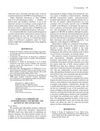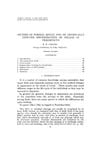 March 2024 in “Bioactive Materials”
March 2024 in “Bioactive Materials” New treatment using engineered nanovesicles in hydrogel improves hair growth by repairing hair follicle cells in a mouse model of hair loss.
 December 2023 in “Aggregate”
December 2023 in “Aggregate” Scientists are using clumps of special stem cells to improve organ repair.
May 2023 in “International journal of molecular sciences” The ABCA4 gene protects hair follicle stem cells from toxic vitamin A byproducts.

Androgen suppression therapy (AST) doesn't significantly lower bladder cancer risk, but using finasteride, a type of AST, might reduce it. AST decreases recurrence-free survival but doesn't affect overall survival or progression-free survival. More research is needed to understand AST's benefits.
2 citations,
June 2018 in “Cosmetics” AMPD is a better and less damaging alternative to ammonium hydroxide for hair bleaching.
 80 citations,
April 2011 in “Plant physiology”
80 citations,
April 2011 in “Plant physiology” White lupin uses specific genes to grow root hairs and access phosphorus when it's scarce.
 3 citations,
January 2006 in “Dermatologic Surgery”
3 citations,
January 2006 in “Dermatologic Surgery” The International Society of Hair Restoration Surgery established a curriculum in 2005 to standardize knowledge and skills for treating hair loss, emphasizing it as a multidimensional specialty.
 3 citations,
March 2020 in “International Journal of Molecular Sciences”
3 citations,
March 2020 in “International Journal of Molecular Sciences” Thymosin β4 helps increase hair growth in Cashmere goats.
 October 2020 in “Veterinary Dermatology”
October 2020 in “Veterinary Dermatology” New treatments and diagnostic methods for various animal skin conditions showed promising results.
 July 2024 in “Clinical Cosmetic and Investigational Dermatology”
July 2024 in “Clinical Cosmetic and Investigational Dermatology” Non-drug therapies show promise for hair regrowth but need more research.
1 citations,
January 2004 in “Hair transplant forum international” Ethical standards and scientific insight are key to growing the hair restoration market.
 March 2024 in “JEADV. Journal of the European Academy of Dermatology and Venereology/Journal of the European Academy of Dermatology and Venereology”
March 2024 in “JEADV. Journal of the European Academy of Dermatology and Venereology/Journal of the European Academy of Dermatology and Venereology” Hair transplant surgery using micropunch can cause blood vessel damage similar to vasculitis in some cases.
 January 2022 in “DOAJ (DOAJ: Directory of Open Access Journals)”
January 2022 in “DOAJ (DOAJ: Directory of Open Access Journals)” Argan oil-based nano carriers could potentially deliver caffeine to hair follicles to treat hair loss.
 April 2023 in “Actas Dermo-Sifiliográficas”
April 2023 in “Actas Dermo-Sifiliográficas” Low doses of oral minoxidil, a hair loss treatment, can cause temporary morning swelling around the eyes, but it's not serious and can disappear with continued use or dose adjustment.
4 citations,
January 2010 in “Journal of pediatric endocrinology & metabolism/Journal of pediatric endocrinology and metabolism” In India, most patients with type 1 autoimmune polyglandular failure show symptoms in a specific order, starting with parathyroid gland issues, then yeast infections, and finally adrenal gland failure.
June 2020 in “Faculty Opinions – Post-Publication Peer Review of the Biomedical Literature”  February 2016 in “Faculty Opinions – Post-Publication Peer Review of the Biomedical Literature”
February 2016 in “Faculty Opinions – Post-Publication Peer Review of the Biomedical Literature” A hair test can accurately predict if a person with hair loss will respond to minoxidil treatment.
 12 citations,
February 2010 in “Journal of The American Academy of Dermatology”
12 citations,
February 2010 in “Journal of The American Academy of Dermatology” A cancer drug caused unusual hair growth on a 100-year-old man's scalp and eyelashes.
 November 2011 in “Pediatric dermatology”
November 2011 in “Pediatric dermatology” Marie-Unna Hereditary Hypotrichosis is a rare genetic condition causing sparse hair growth, requiring specific recognition for proper care.
 50 citations,
October 1918 in “The journal of experimental zoology”
50 citations,
October 1918 in “The journal of experimental zoology” Artificially inducing hair regrowth in mice can change the normal pattern and timing of hair growth, with minimal color differences between old and new fur.
 6 citations,
February 2016 in “The journal of investigative dermatology/Journal of investigative dermatology”
6 citations,
February 2016 in “The journal of investigative dermatology/Journal of investigative dermatology” A new model using mice with human hair follicles helps better understand hair loss from chemotherapy.
 1 citations,
September 2017 in “Journal of Investigative Dermatology”
1 citations,
September 2017 in “Journal of Investigative Dermatology” Blocking a specific enzyme can reduce the negative impact of stress hormones on hair growth cells.
 April 2018 in “The journal of investigative dermatology/Journal of investigative dermatology”
April 2018 in “The journal of investigative dermatology/Journal of investigative dermatology” Biotrinine® may be an effective treatment for chronic hair loss.
 September 2017 in “Journal of Investigative Dermatology”
September 2017 in “Journal of Investigative Dermatology” The Siah1 and Siah2 genes are active in mouse skin development and hair growth, especially right after birth.
 April 2017 in “Journal of Investigative Dermatology”
April 2017 in “Journal of Investigative Dermatology” The protein CTCF is essential for skin development, maintaining hair follicles, and preventing inflammation.
 February 2014 in “Journal of The American Academy of Dermatology” 2 citations,
November 2011 in “Pediatric dermatology”
February 2014 in “Journal of The American Academy of Dermatology” 2 citations,
November 2011 in “Pediatric dermatology”  February 2023 in “Journal of dermatology”
February 2023 in “Journal of dermatology” The first Japanese case of a genetic hair disorder caused by specific mutations in the LIPH gene was identified.
April 2019 in “Journal of Investigative Dermatology” Y27632 increases cell growth through EGFR signaling, not ROCK1/2.
2 citations,
June 2017 in “The journal of investigative dermatology/Journal of investigative dermatology” Epigenetic factors play a crucial role in skin health and disease.





















